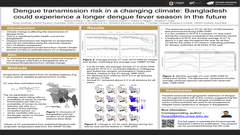Dengue transmission risk in a changing climate: Bangladesh could experience a longer dengue fever season in the future
ID:3
Submission ID:3 View Protection:ATTENDEE
Updated Time:2021-06-11 14:40:03
Hits:939
Poster Presentation

Start Time:2021-06-14 11:00 (Australia/Brisbane)
Duration:20min
Session:[ES] E-poster » [SE] E-Poster
Presentation File
Tips: The file permissions under this presentation are only for participants. You have not logged in yet and cannot view it temporarily.
Abstract
Our changing climate is already affecting the transmission of vector borne diseases such as dengue fever. This issue presents a significant public health concern for some nations, such as Bangladesh, which already experience regular seasonal outbreaks of dengue fever under present day conditions. To provide guidance for proactive public health planning to potentially mitigate future infections, we explore the impact of climate change on dengue infections by calculating the change in vectorial capacity of Aedes aegypti mosquito at a seasonal level for all regions in Bangladesh under two atmospheric greenhouse gas concentrations for the period 1950-2099. For each of the four climate models used, and for both scenarios, our analysis reveals that the annual vectorial capacity remains at a level that would enable potential dengue epidemic transmission in all regions during the time period examined. We found a slight decline in vectorial capacity in half of the regions examined during the last two decades of 21st Century for the lower-concentration scenario, with a pronounced decline in vectorial capacity in all geographic regions beginning in 2060 for the higher-concentration scenario. The likely reason is that in many regions greenhouse warming is leading to temperatures beyond the optimum for mosquito breeding. However, seasonal differences in vectorial capacity dissipate as the climate warms, to the point that there is almost no observable seasonality for the higher-concentration scenario during the last two decades of the century. This suggests the potential for the dengue season to extend all year, with outbreaks occurring at any time. These findings suggest that disease surveillance and control activities would need to be geographically and temporally adapted to mitigate dengue epidemic risk.
Keywords
vectorial capacity,global climate model,outbreak risk,mosquito-borne disease
Comment submit